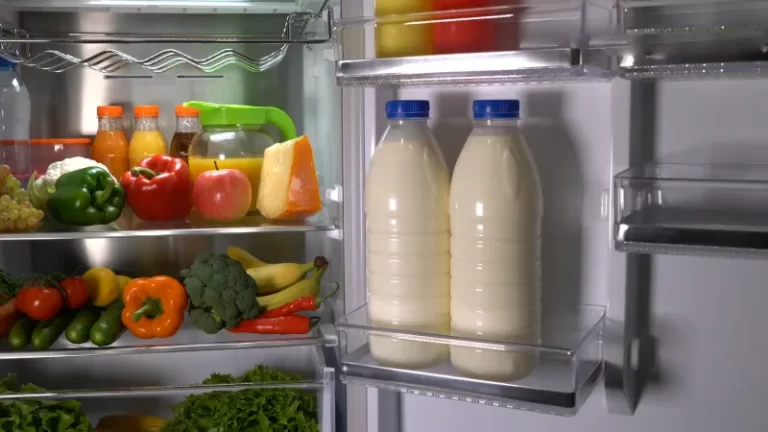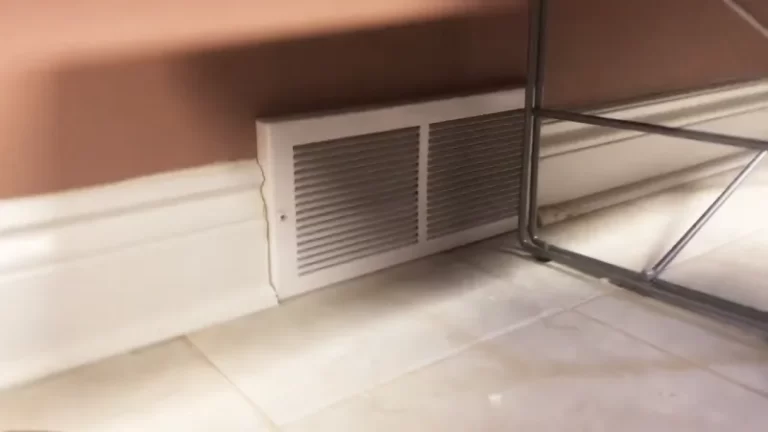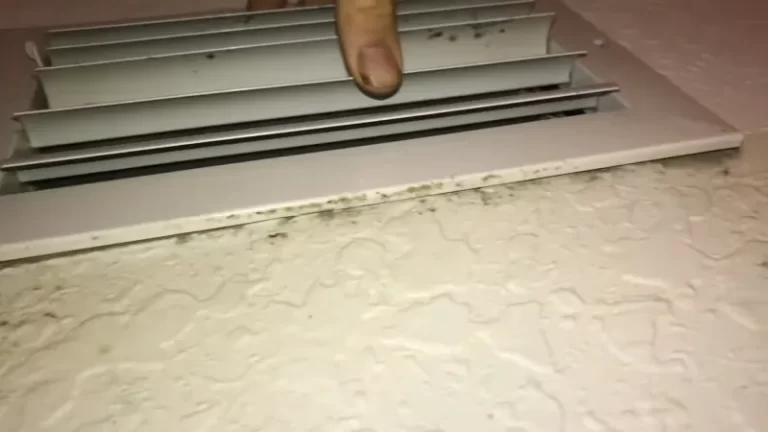Bosch Refrigerator Noise Problems and Solutions
Bosch refrigerators are known for their high-quality and sleek design, but even the best refrigerators can have problems. One common issue with Bosch refrigerators is noise. Whether it’s a knocking, buzzing, or humming sound, a noisy refrigerator can be a nuisance and may indicate a problem with the appliance.
In this blog, we will discuss some of the most common reasons for Bosch refrigerator noise problems and what you can do to fix them.
You'll Learn About
Bosch Refrigerator Noise Problem
Bosch refrigerators are known for their reliability, but sometimes they may start making noise. The noise can be caused by a problem with the evaporator fan or condenser fan, or if the door is not completely shut.
To solve the noise problem, one should first check the evaporator fan. If the fan blade is at fault, it may need to be replaced. If the noise is still present, it may be a problem with the compressor, which is a more complex issue that should be handled by a licensed technician.
In some cases, ice build-up in the fridge can also cause noise, and defrosting the fridge can solve the issue. It is important to address the noise problem as soon as possible, as it can affect the performance of the fridge and lead to cooling problems.
Reason 1: Evaporator Fan Blade
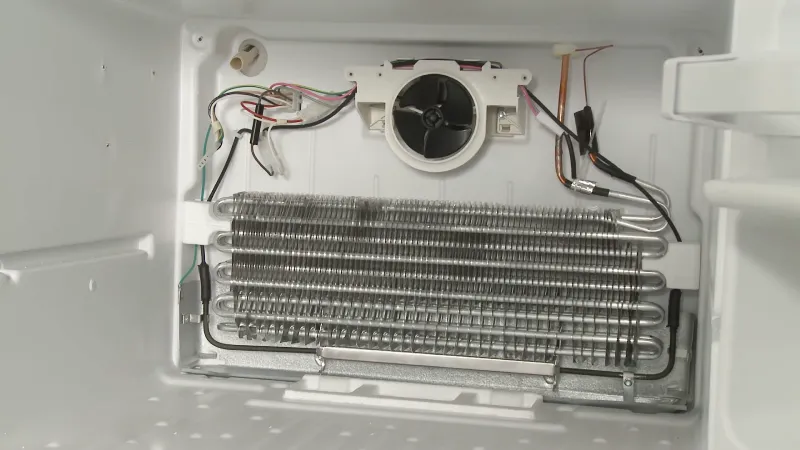
Bosch refrigerators are known for their durability and efficiency, making them a popular choice among households. Despite their reputation, Bosch refrigerators can still experience some noise problems, which can be caused by several factors. In this article, we will discuss some of the common reasons for Bosch refrigerator noise problems and provide practical solutions for each.
The evaporator fan blade is one of the most common causes of noise problems in Bosch refrigerators. The fan is responsible for distributing cold air from the evaporator to the rest of the refrigerator. If the fan blade is not functioning properly, it can cause a loud, rattling noise, especially when the doors are opened.
Symptoms of a Faulty Fan Blade
The symptoms of a faulty fan blade include:
- Loud, rattling noise, especially when the doors are opened
- Decreased cooling efficiency in the refrigerator
- Warm or hot spots in the refrigerator
How to Check and Fix the Fan Blade
If you suspect that the fan blade is causing the noise problem in your Bosch refrigerator, you can check and fix it as follows:
- Locate the fan blade: The fan blade is typically located behind the freezer compartment. You will need to remove the back panel of the freezer to access it.
- Check the fan blade: If you notice any cracks, chips, or damage to the fan blade, it may need to be replaced. If the fan blade is clogged with ice, it can also cause noise problems.
- Replace the fan blade: If the fan blade is damaged or needs to be replaced, you will need to unplug the refrigerator and remove the screws that hold the fan blade in place. Replace the fan blade with a new one of the same size and shape.
Bosch refrigerators are known for their reliability and efficiency, but they can still experience noise problems. If your Bosch refrigerator is making a loud, rattling noise, it could be due to a faulty evaporator fan blade. By checking and fixing the fan blade, you can solve the noise problem and restore your refrigerator to optimal performance.
Reason 2: Door Not Completely Shut
The noise level of a refrigerator can be affected by the door being not completely shut. If the door is not closed properly, it can cause the cooling fan inside the fridge to work harder, producing more noise. This can also cause the refrigerator to work less efficiently, potentially leading to food spoilage and increased energy consumption.
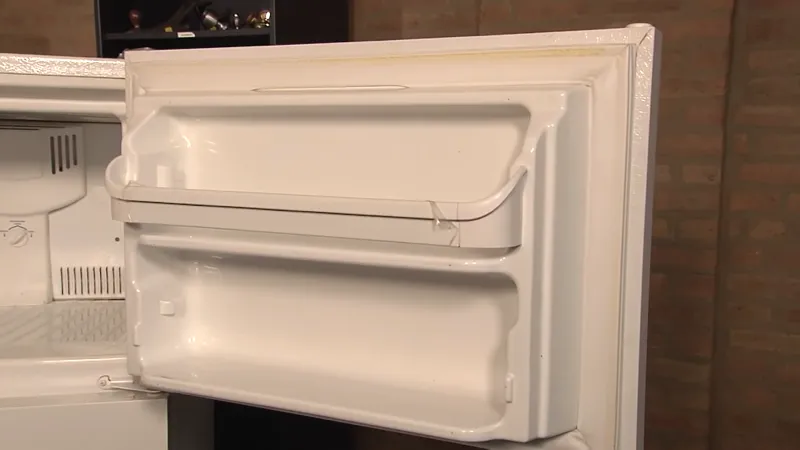
How to Check and Fix the Door
- To check if the door is the cause of the noise, simply close the door firmly and listen to see if the noise level decreases. If the noise level does not decrease, then the door is not the cause of the problem.
- If the noise level decreases, then the door gasket or hinges may need to be inspected and fixed. To fix the door, the gasket may need to be replaced if it is worn or damaged. If the hinges are the issue, they may need to be tightened or lubricated.
- If the door still does not close properly after these steps, it may need to be adjusted or replaced.
Fixing a refrigerator door that is not completely shut can be a simple and cost-effective solution to reducing noise levels and improving the efficiency of the appliance. If you are unsure about fixing the door yourself, it is always best to consult a professional for guidance and assistance.
Reason 3: Compressor Issues
The compressor is the heart of the refrigerator and is responsible for pumping refrigerant through the system to maintain a constant temperature. It compresses refrigerant gas and sends it through the condenser coil, where it releases heat and condenses back into a liquid.
The refrigerant then flows through an expansion valve, where it becomes a low-pressure gas and is sucked into the evaporator coil. The refrigerant then evaporates, absorbing heat from the interior of the refrigerator, and returns to the compressor to start the cycle again.
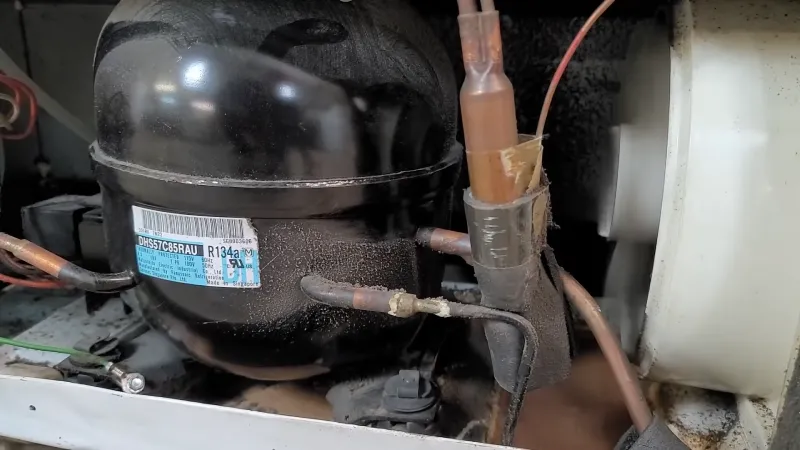
Symptoms of a Faulty Compressor
If the compressor is faulty, it can cause various problems, including increased noise levels. Some common symptoms of a faulty compressor include:
- Increased noise levels
- Refrigerator not cooling properly
- Strange sounds like hissing, humming, or clicking
- Compressor overheating
- A burning smell coming from the refrigerator
Importance of Calling a Licensed Technician for Compressor Repairs
If you suspect that your Bosch refrigerator’s compressor is faulty, it is important to call a licensed technician to repair it. Attempting to repair a compressor can be dangerous and can result in further damage to the refrigerator. A licensed technician will have the experience, knowledge, and equipment to diagnose and repair your compressor correctly.
It is important to note that refrigerators contain refrigerant, which is flammable and can be hazardous if not handled properly. Only licensed technicians have the training and certification to handle refrigerants safely.
If you’re experiencing increased noise levels or other symptoms of a faulty compressor in your Bosch refrigerator, it’s important to have it inspected by a licensed technician. Attempting to repair it yourself can result in further damage and can be hazardous. Contact a licensed technician to diagnose and repair your compressor safely and effectively.
Reason 4: Ice Build-up
In a refrigerator, the freezer compartment is responsible for removing heat from the interior to keep it cold. The evaporation of the refrigerant that occurs in the coils inside the freezer compartment cools the air, which is then circulated into the refrigerator compartment to keep it cool. When ice builds up on the coils, it can cause several problems, including blocking the flow of air, reducing the efficiency of the cooling process, and causing increased noise.

How to Defrost the Fridge and Prevent Ice Build-up
To defrost your fridge and prevent ice build-up, you’ll need to empty all the contents, unplug the fridge, and let it defrost for several hours. Once it has defrosted, you can wipe it down with a clean cloth and plug it back in.
To prevent ice build-up from occurring in the future, you should keep the fridge and freezer compartments clean, avoid overloading the compartments, and make sure that the doors are closing properly. If you notice that your fridge is still making excessive noise after defrosting, it may be a sign of a more serious issue, such as a malfunctioning compressor, and you should have it checked by a licensed technician.
Reason 5: Excessive Air or Water Vapor Leaks
In a normal situation, the compressor is cooled to a temperature of 32 degrees Fahrenheit by refrigerant before it is used to compress the gas again. However, if the compressor is too cold, water vapor or air can enter the coils in the compressor, which can cause excessive wear on the motor. If the compressor has excessive air or water vapor leaking, it can cause the compressor to overheat and possibly result in damage.
Symptoms of Excessive Air or Water Vapor Leaks
If you suspect that your refrigerator compressor is leaking water vapor or air, you will need to inspect the water reservoir inside the compressor. If the water level is low, this could be the cause of the water leak. To prevent this from recurring, it is important to keep the reservoir filled with water so that it can cool down the compressor.
As for air leaks, the compressor can actually leak a small amount of air for a limited time after the door has been shut. If you are experiencing excessive air leaking, you should get the refrigerator checked out by a licensed technician.
Reason 6: Over-filling the Fridge
Over-filling the freezer compartment can cause increased noise levels, reduced efficiency, and various other problems. To prevent this, the water reservoir needs to be kept full, and the levels of water, ice, and other items should be checked frequently to ensure that the temperature does not fluctuate excessively.
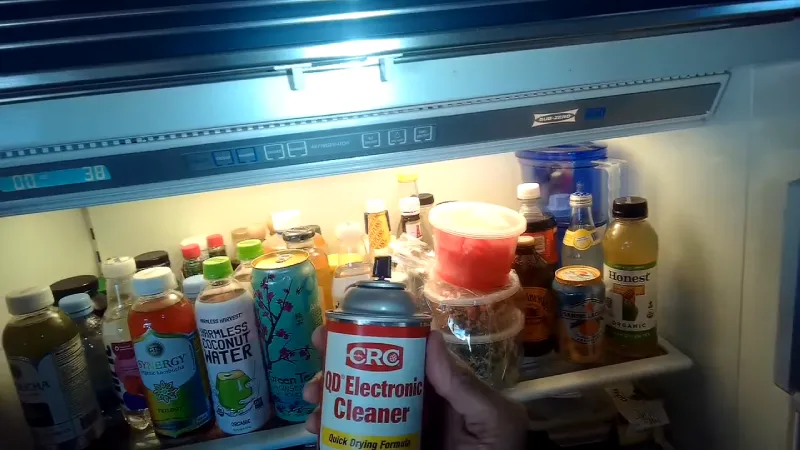
Reason 7: Refrigerator Opening Too Often
As a refrigerator ages, it can become less efficient. This can be caused by the refrigerator opening too often, which can cause it to lose ice, causing increased noise. It is important to properly store items in your refrigerator to avoid frequent opening, which can also result in other issues, including reduced efficiency and excess moisture build-up. Sometimes, the water filter also gets problems.
What to Do With Older Refrigerators
To avoid similar problems with other refrigerators, follow these tips:
Maintain and store food properly: Always store food in the proper place in the fridge, rather than on the floor or on the door. If you find that your refrigerator is no longer cooling properly or making noise, clean and organize the shelves.
Store perishable foods in a separate fridge: Freezers, while also important, are not as crucial as fridges. If you are storing food that you cannot eat without freezing it, then make sure it is stored in a separate refrigerator that is working properly and is cleaned regularly.
Consider replacing the refrigerator with a new model: You may want to consider replacing your older refrigerator if it is inefficient and noisy. Many older refrigerators are energy inefficient, making it more likely that you will spend money on excessive electricity bills. If you don’t want to purchase a new refrigerator, it may be worth your time to hire a professional to repair it.
Conclusion
Bosch refrigerators are known for their quality and reliability, but like any other appliance, they can experience noise problems. Some of the most common reasons for noise in Bosch refrigerators include faulty evaporator fan blades, doors not being shut completely, compressor issues, and ice build-up.
It’s important to address the noise issue quickly, as ignoring it could lead to bigger problems down the line. By understanding the causes and taking the appropriate steps to fix them, you can ensure that your Bosch refrigerator runs quietly and efficiently.
Regular maintenance, such as cleaning and defrosting, can also help prevent noise problems. If you’re unsure about the cause of the noise or how to fix it, it’s always best to call a licensed technician for professional assistance.

